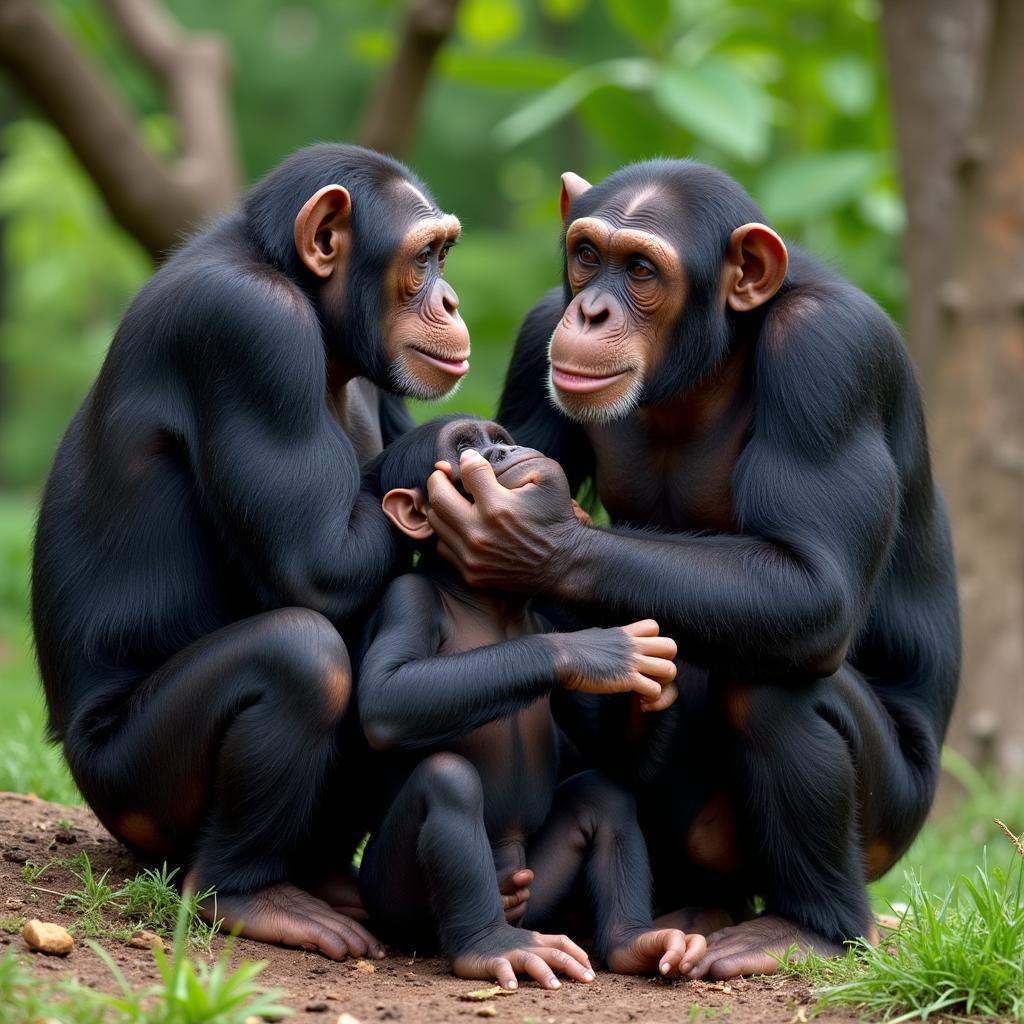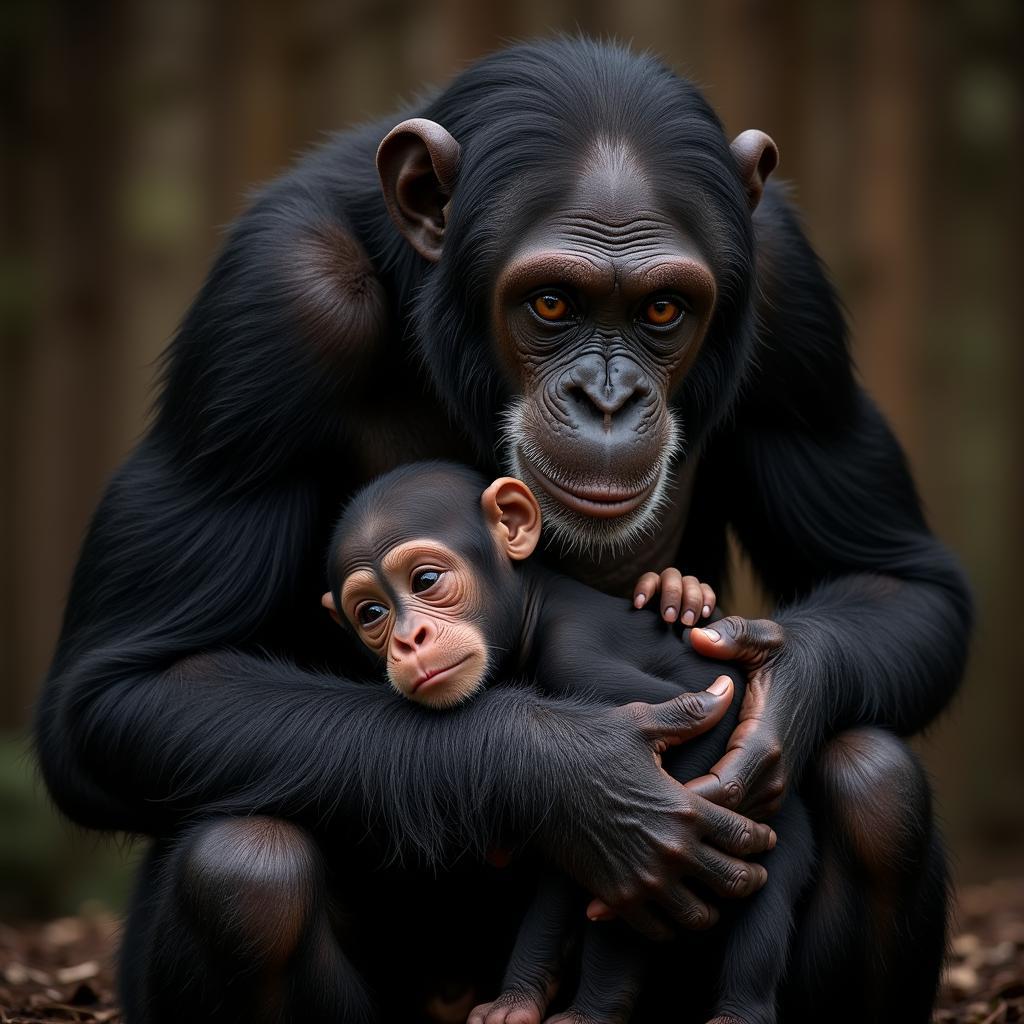Unveiling the Secrets of the African Black Chimpanzee
The African Black Chimpanzee, scientifically known as Pan troglodytes, is a fascinating primate inhabiting the rainforests and savannas of Central and West Africa. These intelligent creatures share about 98.7% of their DNA with humans, making them our closest living relatives in the animal kingdom. This genetic proximity is reflected in their complex social structures, impressive cognitive abilities, and remarkable capacity for tool use.
Delving into the World of the African Black Chimpanzee
Chimpanzees are highly social animals, living in communities called troops that can range in size from a few dozen to over a hundred individuals. Within these troops, a complex social hierarchy exists, with males typically vying for dominance. Communication plays a crucial role in chimpanzee society, encompassing a vast repertoire of vocalizations, facial expressions, and gestures.
 African Black Chimpanzees Socializing
African Black Chimpanzees Socializing
Masters of Adaptation: Habitat and Diet
African black chimpanzees demonstrate remarkable adaptability, thriving in a variety of habitats, including dense rainforests, woodland-savanna mosaics, and even dry savanna. This adaptability is reflected in their diverse diet, which encompasses a wide array of fruits, leaves, insects, and even meat.
Chimpanzees are known for their impressive hunting skills, often working cooperatively to capture small mammals like monkeys and duikers. They display remarkable ingenuity in their foraging techniques, using tools such as sticks to extract termites from mounds and rocks to crack open nuts.
Conservation Challenges and Hope for the Future
Sadly, the African black chimpanzee faces an array of threats, primarily driven by human activities. Habitat loss due to deforestation, driven by agriculture, logging, and mining, is a significant concern. The illegal pet trade and bushmeat trade also pose serious threats to chimpanzee populations across their range.
african jungle animals and plants
Fortunately, dedicated conservation efforts are underway to protect these incredible creatures. These initiatives include establishing and managing protected areas, combating the illegal wildlife trade, and promoting sustainable land-use practices. Raising awareness about the plight of the African black chimpanzee and engaging local communities in conservation efforts are also crucial to ensuring their long-term survival.
 Protective Chimpanzee Mother and Infant
Protective Chimpanzee Mother and Infant
The Enduring Fascination of the African Black Chimpanzee
The African black chimpanzee stands as a testament to the incredible biodiversity of the African continent. Their intelligence, social complexity, and capacity for tool use continue to captivate scientists and nature enthusiasts alike. By understanding the challenges they face and supporting conservation efforts, we can help ensure that these remarkable creatures continue to thrive in the wild for generations to come.
FAQ: Unraveling the Mysteries of the African Black Chimpanzee
1. How Intelligent Are African Black Chimpanzees?
African black chimpanzees possess remarkable intelligence, evidenced by their problem-solving skills, tool use, and complex communication. They are capable of learning sign language, using tools for various purposes, and engaging in strategic hunting.
2. What is the Social Structure of Chimpanzee Troops?
Chimpanzee troops exhibit a complex social hierarchy, often with an alpha male at the top. However, power dynamics can shift, and females also play a significant role in the social structure.
3. Why Are African Black Chimpanzees Endangered?
Habitat destruction, the illegal pet trade, and the bushmeat trade are the primary threats to African black chimpanzees.
4. How Can I Help Protect African Black Chimpanzees?
You can support conservation organizations working to protect chimpanzees, spread awareness about their plight, and make responsible choices as a consumer to avoid contributing to deforestation or the illegal wildlife trade.
5. What is Being Done to Conserve Chimpanzee Populations?
Conservation efforts include establishing protected areas, combating poaching and illegal trade, and working with local communities to promote sustainable land-use practices.
Need More Information?
For further insights into the fascinating world of African wildlife, explore these related articles:
Do you have more questions or need further assistance? Don’t hesitate to contact us:
Phone: +255768904061
Email: kaka.mag@gmail.com
Address: Mbarali DC Mawindi, Kangaga, Tanzania
Our dedicated customer support team is available 24/7 to assist you.

